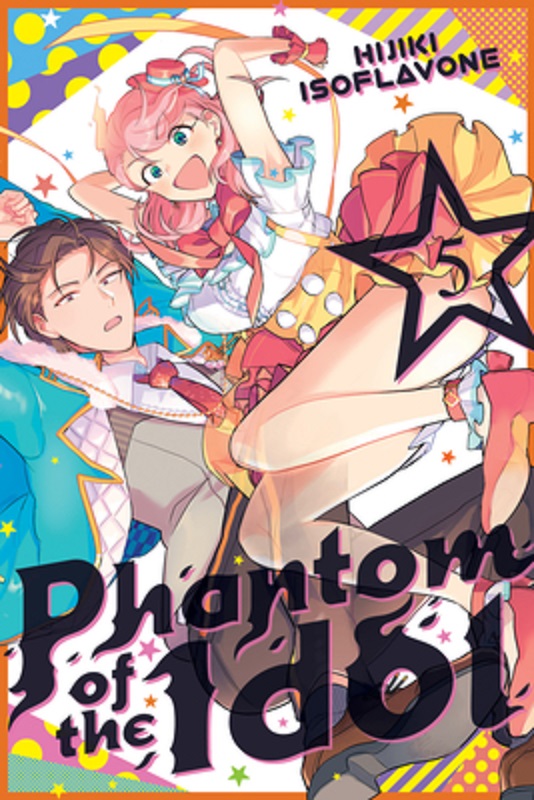Manga Review: Phantom of the Idol 5 by Hijiki Isoflavone
Like many young people, Yuya Niyodo used to think that idol singers had it soft. You get paid for looking pretty, singing with Autotune ™ and performing a few basic dance steps, right? Not like the “real” jobs Yuya had available to him at the lower end of the market. And since Yuya’s all about getting maximum money for minimum effort, his being scouted to become part of a pop duo was heaven-sent. He has dark good looks and a pleasant singing voice, and that seemed to be all he needed. But in reality, being an idol involves a lot of training and hard work, and having to maintain a good relationship with the fans.

So in the team that is Zings, Yuya’s partner Yoshino has been doing all the heavy lifting, while Yuya becomes increasingly dead inside. Yuya’s on the verge of being fired, which isn’t good, because instead of being able to rest, he’ll have to go back to grueling physical labor. But then Niyodo runs into a girl dressed like an idol that no one else can see. This turns out to be the ghost of Asahi Mogami, who was a rising star until her tragic death last year. Her love of being an idol is undiminished by her non-corporeality, which binds her to the Earthly sphere.
After some hijinks, the two make a deal. Yuya allows Asahi to possess his body from time to time to handle the idol stuff, relieving him of the mental effort. Suddenly stage!Yuya is enthusiastic, dedicated and loves the audience, and Zings is on its way to the top of the charts.
In this volume, we open with the story of a convenience store clerk with a miserable life who becomes interested in the handsome but taciturn customer who comes in every day to buy one onigiri rice ball, except for the day when he’s peppy and buys a pudding cup instead. She learns that he’s an idol, and becomes a fan of Zings, but realizes she still doesn’t understand him.
It’s time for the “Up Next” awards, which spotlights rising new idols and groups. Niyodo could possibly care less, but Asahi is pumped.
When the top winners beg off their big prize as they have other obligations, Yuya finds himself with a supporting role in a J-drama detective show. The star is Yakumo “Black Prince” Nanase, whose flamboyant stage persona and deep lore have given him a particularly dedicated set of fans. Fans that may not want him to branch out into other fields. (Shades of Perfect Blue!)
Thanks to Asahi, Yuya is nailing his part, but Nanase is having more difficulty. It turns out that his “Black Prince” persona isn’t an act, it’s the real him, while his “normal” self is him dialing it way down to exist in the mundane world. He’s never learned how to act. And because he’s not in on the secret, Nanase thinks Yuya is a master actor.
There’s also two bonus chapters. In one, Zings’ coworker Yura, who used to know Asahi back in the day, hangs out with Yuya and Asahi for a few hours.
The other one is backstage at the awards show, where a presenter is a huge Zings fan, but must keep the outcome secret until the proper time, and he’s not dealing well with it.
Plus some communication from the creator!
The primary audience in Japan are in the josei (young women’s) market, but junior high students on up should be able to handle it, there’s no real content problems in this volume.
This is mildly amusing work comedy, with the contrast between the unenthused Niyodo and overenthusiastic Mogami carrying most of the humor.
Interestingly, very little of the comedy comes from a female ghost inhabiting a male body. This may have been covered more in previous volumes, but no one seems to notice more feminine speech patterns and body language when Asahi possesses Yuya, just that he’s more friendly and outgoing.
The art is decent, but suffers a bit from most of the characters fitting into a fairly narrow range of conventional attractiveness. Niyodo’s “dead inside” look stands out even more than it might otherwise.
Recommended for “idol plus fantastic premise” fans who find Oshi no Ko a little too cynical about the entertainment industry,

